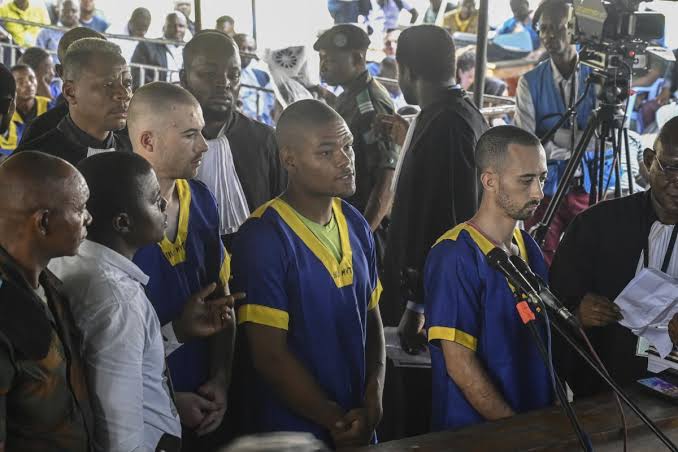A military court in the Democratic Republic of Congo has sentenced three Americans and 34 others to death following a failed coup attempt in Kinshasa, the nation’s capital.
The coup attempt, which took place on Sunday, involved an attack on the presidential palace and the residence of a close ally of President Felix Tshisekedi. The incident led to a brief but intense confrontation that resulted in the deaths of three individuals.
According to Brigadier General Sylvain Ekenge, spokesperson for the Congolese army, the plotters were arrested shortly after the attack, and the situation was quickly brought under control. Ekenge revealed that three of those sentenced to death were American citizens, including the son of the opposition leader who led the failed coup, Christian Malanga.
The coup plotters had initially been identified by local media as Congolese soldiers, but later reports indicated that they were linked to Malanga, a self-exiled opposition figure based in the United States.
Malanga, who had long been a critic of President Tshisekedi, was killed during the attack on the presidential palace after resisting arrest by security forces, according to Ekenge. His death marked the end of the coup attempt but sparked a series of arrests and trials that have gripped the country.
Ekenge announced on state television that the coup attempt was “nipped in the bud” by Congolese defense and security forces, ensuring that the situation remained under control. He also confirmed that several foreigners were among those involved in the attack, including the three Americans.
One of the Americans sentenced to death was Malanga’s son, Marcel Malanga. According to reports from the court, Marcel was coerced into joining the coup by his father, who had threatened to kill him if he refused.
Marcel Malanga, in his defense, told the court that it was his first visit to Congo, having been invited by his father. He also claimed that he had not seen his father for years and had been unaware of the coup plan until he arrived in Kinshasa.
Also sentenced to death was Tyler Thompson, a friend of Marcel who had traveled with him to Congo. Both young men, who played high school football together in Utah, were in their early twenties and were caught up in the political upheaval that followed the failed coup.
The third American sentenced to death, Benjamin Zalman-Polun, was a business associate of Christian Malanga. Zalman-Polun had been involved in business dealings with Malanga in the United States but became embroiled in the coup plot when he accompanied Marcel and Tyler to Congo.
All three Americans were convicted on charges of criminal conspiracy, terrorism, and involvement in the attempted coup. The trial, which attracted widespread media attention, culminated in the reading of the verdict on live television.
The trial took place under a tent in the yard of Ndolo military prison on the outskirts of Kinshasa. The defendants, including the three Americans, were dressed in blue and yellow prison uniforms as they sat before the military judge.
The Americans were among approximately 50 individuals on trial for their role in the coup attempt. Others included citizens of the United States, Britain, Canada, Belgium, and Congo.
Christian Malanga had been a prominent opposition figure in Congo for years and was the leader of the United Congolese Party (UCP), which operates primarily from the Congolese diaspora. The UCP describes itself as a platform for uniting Congolese people around the world against what it calls the “current Congolese dictatorship.”
Following the failed coup, a video surfaced on social media showing Malanga at the presidential palace surrounded by armed men in military uniforms. In the video, Malanga declared, “Felix, you’re out. We are coming for you,” in a direct threat to President Tshisekedi.
Tshisekedi, who was re-elected in December amid controversy and opposition claims of electoral fraud, has faced mounting political challenges. His re-election was marred by accusations of a lack of transparency, a trend that has been observed in previous elections in the country.
The coup attempt occurred against a backdrop of political turmoil within Tshisekedi’s ruling party. A parliamentary election scheduled for the Saturday before the coup was postponed, leading to increased tension within the Sacred Union of the Nation ruling coalition.

